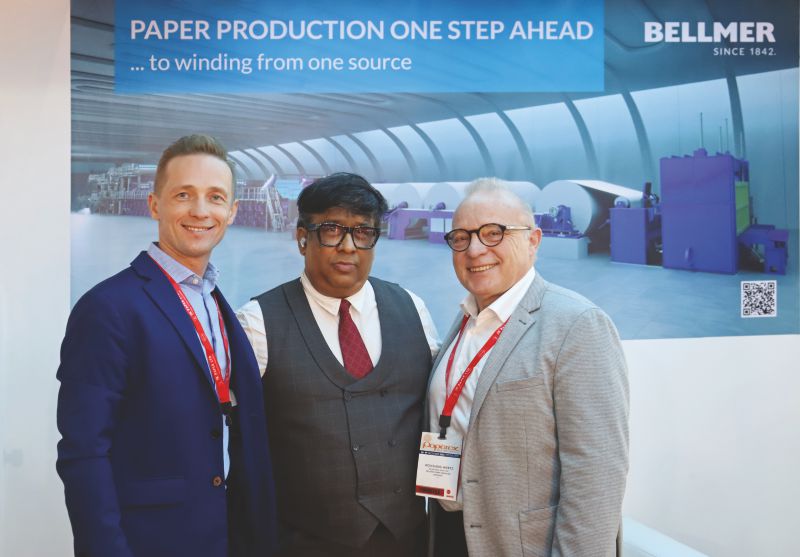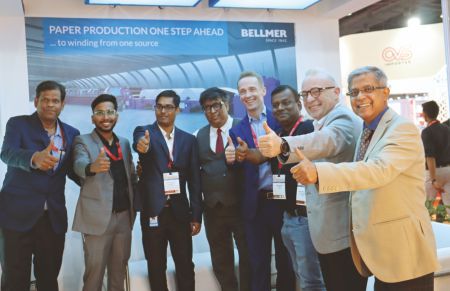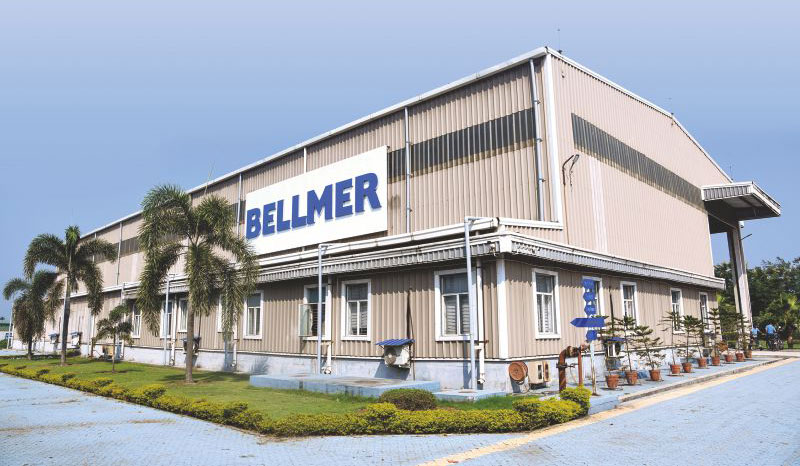Bellmer as a group is a very long-known traditional company that originated in Niefern, Germany. For more than 180 years, their customers have benefited from Bellmer’s long-lasting experience in the field of pulp and paper production. In 2009, Bellmer came to India in sync with the marker prerequisites, looking into the general economic indexes, to develop a cost-effective solution for the Indian market, which was being imported until that time. The Indo-German joint venture company, Bellmer India was conceived with the expected growth of pulp and paper machines in India and the corresponding growing demands for modern calenders with corresponding services. Currently, Bellmer operates EUR 200 million business. In a recent interaction with Paper Mart magazine, Mr. Wolfgang Wiertz, Managing Director, Bellmer GapCon, Mr. Johannes Kaiser, Director of Capital Sales, Bellmer GapCon, and Mr. Ranajoy Chowdhury, Managing Director, Bellmer India, talked about the group, their outlook of the Indian market, and their key clients in India. They also talked about a few projects with the Indian paper mills.

Paper Mart: Please tell us about Bellmer as a group and its core values and philosophy.
Wolfgang Wiertz: Established in 1842, Bellmer is already in the seventh generation. Bellmer as a group is a very long-known traditional company that originated in Niefern, Germany. For more than 180 years our customers have benefited from Bellmer’s long-lasting experience in the field of pulp and paper production. Earlier, it was a medium-sized paper machine-making company, with around 200 people in Niefern. In 1994, the three brothers, Philipp, Martin, and Erich, joined and started expanding the company through acquisitions, adding products and markets. In 1995, they purchased the company Bruderhaus thus strengthening their specialty paper machine knowhow.
Furthermore, in 2004, Bellmer founded its first foreign subsidiary in Shanghai, China. In 2013, Bellmer acquired Vaahto, Finland for the head boxes and top formers. Thereafter Bellmer Group acquired GapCon in 2015, with the objectives of reinforcing their presence in Asia and knowledge specific to shoe presses, calenders and winders. Since then the group has rapidly grown, becoming an OEM serving activities from stock preparation up to the winders, worldwide. The last acquisition was of Papcel, Czech in 2020. Today we are operating a business in excess EUR 200 million and have employees close to 800.
The group’s philosophy is to make customers happy at the end of the day. We cannot survive in the market with products low on performance or quality. So our products must be extremely good, we must be flexible, and also give the customers service and long-term relationships. We, Mr. Ranajoy Chowdhury and myself, brought Bellmer to India in 2009. GapCon was the first company to invest money in asset building in India including shops, equipment, and people. This took us many years to build what we have today.
PM: Please tell us a bit more about Bellmer India and the reason behind its formation.
Ranajoy Chowdhury: The idea behind the establishment of Bellmer India was to develop a cost-effective import substitution for the Indian market, aligning with the fundamentals of the economy of India. Mr. Wolfgang Wiertz and I were on the same page to do something unique for India. We came into the market to educate everyone on modern calendering practices and today, the same technical advancements have been adopted by the Indian paper industry that too at a price which aligns with the market. Bringing in technology within the reach of Indian mills has contributed to the growth of the industry and the corresponding bottom lines, and this is a model which we believe is sustainable. Bellmer India is also focusing on developing a team of leaders and technologists that will help not only Bellmer India but the group to establish a permanent footprint in the Indian market. Bellmer India yearns to develop customers and their trust and stops short of looking into bottom lines. So we are here to stay. The love, trust, and affection we get from paper mills is unparalleled. Our German counterparts diligently help us to complement our efforts and we effectively work with them and our customers as a family.
Watch: Top Paper Companies 2023
PM: How do you make your customer’s manufacturing processes more efficient in India?
WW: In my view, there are two types of customers: one who provides just specifications, gets a quote, and gives the order, and the other customer is the one who develops a project or an investment plan with us. Because we are machine builders and not paper makers, we are not daily present in the paper mills. We have to learn from the customers, get the ideas, and implement them into the project. So, it’s through active listening and collaboration with our customers that we truly understand their needs and make the project a success at the end of the day. This needs a good sales force and a good understanding of the customer’s objectives.
This was our wish and dream when we started the operation in India, to empower our Bellmer India team by investing in their skills and encouraging them to develop independently. It takes education, time, and a willingness to share our know-how. Covid situation helped us in this area, and there has been a human development in those two to three years, when nobody could travel and our Indian colleagues managed independently.

Johannes Kaiser: We need to have excellent equipment in India that performs well, gives quality products, and enhanced production capacity to the customer. In India, 90 percent of our projects are rebuilds of existing machines, to increase the capacity, or improve the quality, or both. We find a customized solution for every specific case i.e. individual solution that is fitting to a particular machine only, or to a specific product or quality. This is our core strength, our competence.
RC: The main issue is that India is a very price-sensitive country. GapCon and Bellmer have taken a lot of initiative and invested in automation etc, to make the products affordable, without compromising on technology. What we believe as an OEM is that we arguably understand the customer and the fundamentals of the Indian economy, that drives all investments. We are giving them the right product which helps them to reduce their consumptions and enhance their EBITA, as we strongly believe that if the paper mills will make profits, they will come back to us for the next steps. Mr. Wolfgang Wiertz was the first man who introduced Made in India- modern calenders for the Indian market, as in those days it was being imported. And today in India, any customer, who wants to buy a calender, comes to us. We would like to create the same impact with other equipment, which is being imported. With the government’s policy of Make in India, we would have a make in India for additional products, shortly. The objective is to make India self-reliant.
PM: How has been your experience serving the Indian market despite having geographical challenges?
JK: As Wolfgang mentioned, developing a strong team with local colleagues has been crucial to our success in India. Team’s expertise is essential for servicing our equipment, especially considering the 40 calender installations and 16 shoe press installations we have in the market. Having a capable local team ensures prompt and effective support, whether it’s troubleshooting, routine service, emergency repairs, or anything else that might arise.
Last year during an accident at Emami Paper Mills, our team stepped up in a big way when they were in a helpless situation. Within 12 hours of the call, our team was on-site and working diligently. It would have taken days or even weeks for German technicians to get to the site, considering the visa challenges and travel restrictions during the pandemic. But our local team, with their deep understanding of the equipment and the resourcefulness to get the job done, repaired Emami’s PM4 machine within 35 hours, a truly amazing achievement that we are incredibly proud of. And now with a much more developed local team, we are in a position to provide services and not just supply the equipment.
PM: What helped Bellmer develop the human resource out here in India?
RC: The Indian subsidiary’s success can be attributed to a crucial element often missing elsewhere: trust. Our German counterparts have instilled immense trust in the Indian team and thus we got full freedom to drive the business. With trust comes a lot of responsibilities to make the right decisions, which the local team recognizes. According to me, it’s not about technical drawings or diagrams; it’s about empathy and confidence. I believe this “empathic management” is the future of leadership. We understand and support our team on a personal level, keeping them motivated and empowered. Earlier, German OEMs in India focused primarily on sales, leaving troubleshooting and innovations behind. We’re filling that gap and that is why customers come to us, drawn to the trust and expertise embodied by Bellmer.
Also Read: ABB Predicts Bright Future for Paper Industry Set-up for Digitalization
PM: Give us an outline of the Indian client base, or collaborations with Indian paper mills. How is the Indian market treating Bellmer?
WW: For our entity in India, we have a grinding machine, turning machine, and testing machine. We were budgeting 200 rolls to service grind in a year. Even today we are over 300, which we have never expected. The shop is full and we cannot manage more, even if we wish.
JK: Kuantum Papers and Bellmer share a long history of successful collaboration, particularly on PM4, their biggest machine. We’ve supplied key components like the headbox and top-former and even revamped the drying section and calender. We are now bringing the machine to the next level. The project focuses on speed, quality, and efficiency improvements, including innovative modifications like the optimized tail-threading system. What makes this project truly unique is the seamless collaboration between our Indian and German entities. Supplying equipment from both countries not only benefits Bellmer but also provides unparalleled value to Kuantum Papers and benefits the customer.
RC: We did a project with Naini Papers Limited, which is the fastest ground-for-machine in the market. Now, Emami Paper Mills’ PM3 is the fastest writing-printing machine using waste paper in India. We have covered approximately 90 percent of fine paper mills and the coated board for instance. We’ll be going slow in the kraft segment. We are doing good in the calender segment. Our footprints are spread all over the market, more so in fine paper, calender, and substantially high in the servicing part.
No one in the industry is into servicing as they’re just supplying machines. For instance, big mills like JK Paper, West Coast Paper Mill, all their rolls come to us for servicing, which includes rolls and spare parts. We are the only Indian company which is servicing swimming rolls in India. Other companies are sending it to Europe or the United States. Our team members are trained to service all kinds of rolls. The next big step we took was to accept the order to install two shoe presses for a kraft mill in separate machines, in the same plant. It’s an expensive equipment. It’s performing well, aptly supported by its Indian counterpart.



